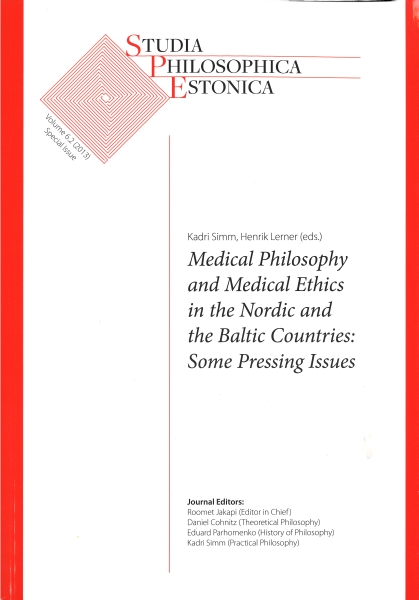How to Respect the Will of Mentally Ill Persons?
DOI:
https://doi.org/10.12697/spe.2013.6.2.03Keywords:
autonomy, informed consent, advance directives, dementiaAbstract
In this article I oppose the current account of autonomy and informed consent in bioethics through criticising the four underlying prejudices of an objectivistic, dualistic, rationalistic and individualistic misunderstanding of the will. With special regard to the case of patients with dementia I argue for the thesis that the principle of autonomy, as moral principles in general, has unconditional and universal validity, but has to be applied differently in the face of specific situations and circumstances by means of the power of judgment (Urteilskraft). As the philosophical resp. anthropological basis of my argument I develop a broad understanding of the will in an Aristotelian and phenomenological sense. The practical consequences of my thesis consist in the ethical requirement of equal respect for the will of mentally ill patients.
Downloads
References
Beauchamp, T. L. and Childress, J. F. (2009). Principles of Biomedical Ethics, Oxford University Press, Oxford.
Blankenburg, W. (1984). Prolegomena to a psychopathology of freedom, in D. Kruger (ed.), The Changing Reality of Modern Man, Juta & Co. Ltd, Cape Town, pp. 174-190.
Dworkin, R. (1994). Life’s Dominion: An Argument about Abortion, Euthanasia, and Individual Freedom, Vintage Books, New York.
Foucault, M. (1954). Maladie Mentaleet Psychologie, Presses Universitaire de France, Paris.
Jens, I. (2009). Interview with Marc Herwig, Die Berliner Literaturkritik. URL: http://www.berlinerliteraturkritik.de/detailseite/artikel/interviewmit-inge-jens.html
Jox, R. J. (2006). Der „natÜrliche Wille” als Entscheidungskriterium: Rechtliche, handlungstheoretische und ethische Aspekte, in J. Schildmann, U. Fahr and J. Vollmann (eds), Entscheidungenam Lebensende: Ethik, Recht, Ökonomieund Klinik, LIT, Berlin, pp. 69-86.
Jox, R. J. (2011). Widerruf der Patientenverfügung und Umgang mit dem natÜrlichen Willen, in C. Meier, H.-J. Heßler, R. J. Jox and G. D. Borasio (eds), Patientenverfügung: dasneue Gesetzinder Praxis, Kohlhammer, Stuttgart, pp. 129-139.
Kant, I. (1996). The Metaphysics of Morals, Cambridge University Press, Cambridge.
Kant, I. (1997). Foundations of the Metaphysics of Morals, Prentice-Hall, New Jersey.
Manson, N. C. and O’Neill, O. (2007). Rethinking Informed Consent in Bioethics, Cambridge University Press, Cambridge.
Merleau-Ponty, M. (1945). PhÉnomenologiede la perception, Librairie Gallimard, Paris.
Rehbock, T. (2012). Person Überden Todhinaus? Zummoralischenund rechtlichen Status der Toten, in A. M. Esser, D. Kersting and C. W. G. Schäfer (eds), Der Tod als Problem der Praktischen Philosophie. Überlegungen zum Begriff des personalen Todes, Campus, Frankfurt, pp. 143-178.
Schopenhauer, A. (1974). Die Welt als Wille und Vorstellung I-II, Wissenschaftliche Buchgesellschaft Darmstadt, Darmstadt. ed. Wolfgang Frhr. von LÖhneysen.
Strawson, P. F. (2008). Freedom and resentment, Freedom and Resentment and other Essays, Routledge Chapman & Hall, pp. 1-26.
Wittgenstein, L. (1977). Vermischte Bemerkungen, Frankfurt am Main.
Wittgenstein, L.(1980). Philosophische Untersuchungen, Frankfurt am Main.

